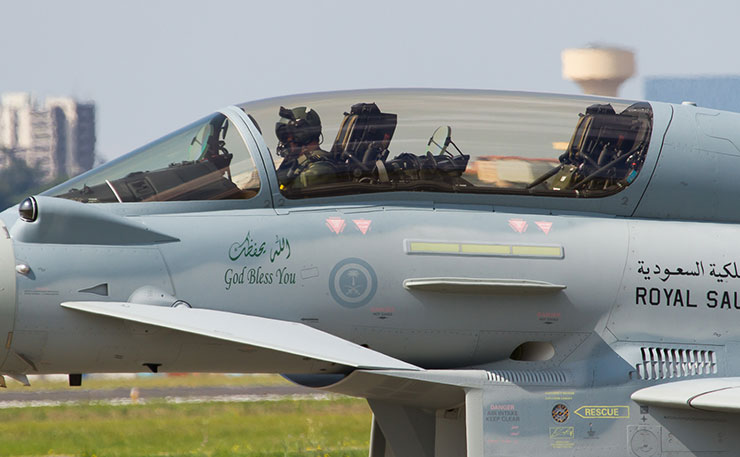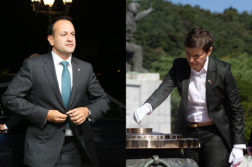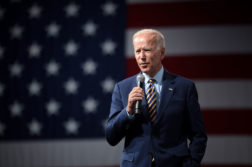Saudi Arabia is unarguably one of the world’s leading abusers of basic human rights. So you’d think that would mean arms sales from decent, democratic nations would be the subject of close scrutiny. Then there’s Australia, writes Michael Brull.
Late last month, Greens Senator Scott Ludlam spent some of a Senate Estimates hearing trying to find out what kind of military exports we’re sending to Saudi Arabia. The government refused to identify those exports in any meaningful way. They also refused to explain the criteria on which they made the decision to permit military exports to the Saudi government.
In the hearing, Senator Ludlam questioned Senator Marise Payne, the Minister for Defence, the Acting Secretary of the Department of Defence, Brendan Sargeant, and Rebecca Skinner, the Deputy Secretary.
Skinner confirmed that Australia has sent four military exports to Saudi Arabia from April 2016, but could not comment on any exports from March this year. Skinner identified the United Arab Emirates as the other “major partner” in the Middle East “with which we have trade arrangements” – ‘we’ presumably refering to the Australian Department of Defence.
Senator Ludlam asked why the Government would not disclose the nature of our military exports to the Saudi government. Skinner explained, “We seek to protect that information from a commercial perspective, as we would not wish for Australian companies to be disadvantaged commercially through us providing, into the public domain, particular commercial information.” She also claimed that, “We rely on them to be open and transparent and provide us high levels of detail around their exports so that we may assess their application, and we seek to protect that information.”
Minister for Defence, Senator Payne went on to claim:
“We have indicated that those details are not provided due to commercial-in-confidence considerations. The process that Defence uses is regulated. It relies on a very frank and open exchange of information with applicants, which includes applicants sharing their sensitive commercial implications. When applicants make an approach for a permit, we undertake to use that applicant’s information for those assessment and compliance activities. Releasing that information would breach that confidence and undermine any trust in our ability to protect applicants’ professional and commercial information, which would, in fact, also be detrimental to our ability to effectively regulate the export of military goods and technology.”
That is, they refuse to disclose the nature of our military exports, as it would leave companies “disadvantaged commercially”. And it would “be detrimental to our ability to effectively regulate the export of military goods and technology”.
Both grounds are hard to take seriously. Other countries disclose the nature and value of their arms deals to Saudi Arabia and other countries. It is hard to believe that Australian arms dealers are only competitive because they alone are kept secret.
Putting that aside, it is hard to believe that vaguely identifying what type of military exports we are sending would create a disadvantage to Australian companies. I defy readers to explain how saying if we are sending bombs, guns, bullets, boats, or whatever else, would in and of itself cause commercial disadvantage to any weapons dealers.
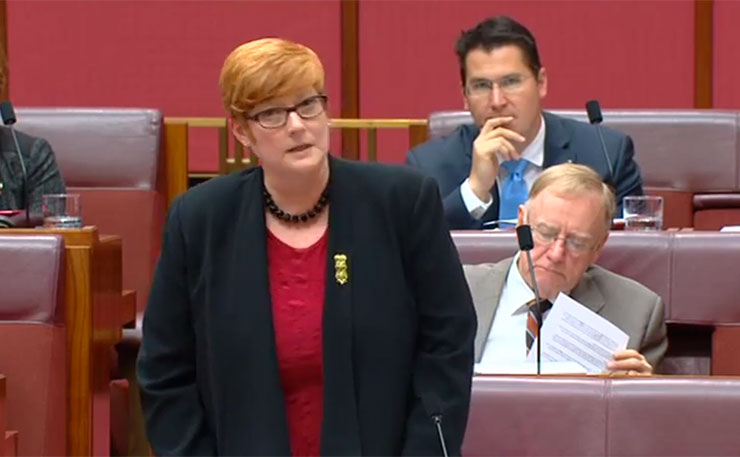
And putting that aside also: it is fundamental in a democracy that the actions of government should be subject to public scrutiny. Even if this created a commercial disadvantage, Australians should know the nature of military exports we are sending to Saudi Arabia, and what effect those exports might have on the catastrophe in Yemen.
It would also create a commercial disadvantage if public outcry forced those exports to halt. Alas, in a democracy, government policy isn’t meant to be solely decided in secret with the representatives of large corporations hawking military equipment and arms.
These claims are hard to take seriously as anything other than the government refusing to disclose our military exports to Saudi Arabia, as they are shameful.
On a positive note, Senators Claire Moore and Alex Gallacher also questioned the government about these military exports. Both are from the Australian Labor Party. Senator Gallacher said that “there is a debate within my own party” about this issue. The public is not yet privy to any other signs of this internal debate.
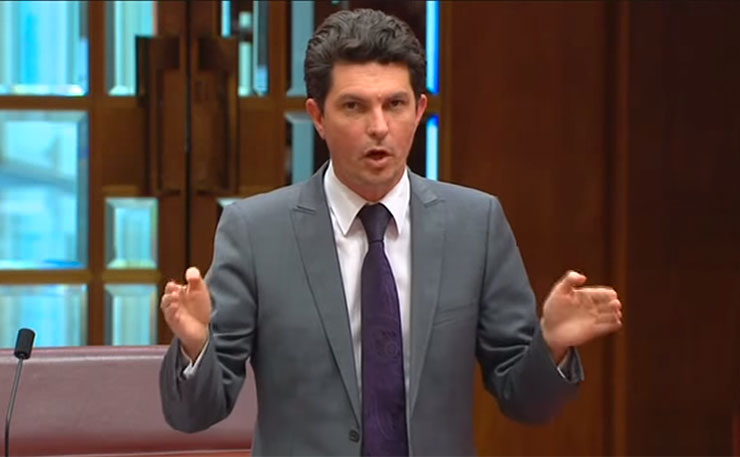
Despite Senator Ludlam’s persistence, he was met with endless stonewalling. Here is one representative example
Mr Sargeant: I just think it is a bit of a misrepresentation to say that the Minister for Defence Industry is an arms dealer or an arms salesman.
Senator LUDLAM: What are we selling?
Mr Sargeant: He is there to develop Australian defence industry.
Senator LUDLAM: By selling?
Mr Sargeant: To support Australian defence in order to build its capabilities.
Senator Ludlam said it would be nice “if somebody were able to tell us what we are actually selling.” Skinner replied: “It is not that helpful to look at individual, specific cases.”
At another point, Skinner claimed that “If we have no concern that the equipment is going to end up in a situation where there would likely cause human rights concerns, the permit is issued.”
Earlier, Senator Ludlam said: “So, according to your judgement, are there war crimes and large-scale human rights abuses occurring in Yemen?”
Skinner: “I do not think that is really a question that I can answer. I am not a Yemen expert.”
So the Department of Defence doesn’t take a position on whether or not there are human rights abuses in Yemen, and sends military exports of some variety to Saudi Arabia and the UAE, but claims that if the equipment would “likely cause human rights concerns”, it would not be given the permit to be exported.
Skinner went on to claim that “We have other ways of monitoring”, although she conceded that “We do not track Australian goods and companies per se”. She went on to claim that, “We have no such concerns in relation to this equipment.”
So they don’t keep track of the war in Yemen, or Australian goods exported, and they have “no concerns” about our equipment being sent to Saudi Arabia. If the Department of Defence is selling strawberries to the Saudi government, perhaps her position is justified. Otherwise, we have little reason to regard her assurances as credible.
Senator Ludlam also requested that they provide the criteria on which they based their decision to grant export permits for military exports to Saudi Arabia. As readers can guess, the government refused to disclose the criteria against which military exports are judged.
Skinner said this was “because it goes to needing to ensure that our export control system is not able to be played and gamed”. That is, if the criteria are secret, then they can’t be cheated.
I would comment, but I have run out of patience. These excuses are so weak as to be pitiful.
The truth is that our support for the Saudi war on Yemen is despicable, and should end.
The government is too ashamed of their military exports to publicly admit them, and hopes that by limiting public awareness of these exports, it can limit public backlash.
Donate To New Matilda
New Matilda is a small, independent media outlet. We survive through reader contributions, and never losing a lawsuit. If you got something from this article, giving something back helps us to continue speaking truth to power. Every little bit counts.

